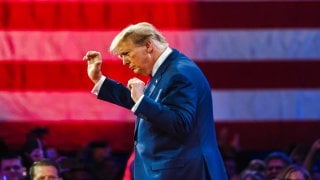America Was the Real Loser in the Presidential Debate
Joe Biden, it’s sad to observe, is showing signs of senility, as reflected in the debate, and he shouldn’t be awarded the Democratic presidential nomination. But he probably will be. And Donald Trump may be the debate’s “default” winner, but if so it isn’t a win that breeds confidence for the future. Indeed, if we’re identifying winners and losers from that cringe-fest exchange, the big loser would be the United States of America and its voting citizenry.
Democrats are panicking over President Joe Biden's debate performance against Donald Trump on Thursday evening. And there’s no doubt that he showed signs of senility at times during the verbal joust. But that doesn’t mean he ceded all prospects of defeating Trump come November. Perhaps the panic isn’t altogether justified by what happened on that debate stage.
Yes, as former Democratic Senator Claire McCaskill of Missouri said after the exchange, Biden “had one thing…to accomplish and that was to reassure America that he was up to the job at his age, and he failed.” But Trump had something to accomplish also, and that was to demonstrate that he could expand his base of support by luring to his banner independent and swing voters. There is no evidence that he did that with a debate performance that was mediocre at best.
Columnist Carlos Lozada of the New York Times wrote that Trump won the debate “by default.” Perhaps he did. But, if Democratic leaders can’t persuade Biden to exit the race, and there’s little likelihood that they can, we’ll be back to square one, with two highly flawed candidates vying to be, in the end, the least flawed. At that point, barring a dramatic, unexpected development or event, either man could win.
Thus perhaps the debate wasn’t the definitive, turning-point event perceived by many pols and pundits on both sides of the political divide. Indeed, once the great mass of voters have time to crank in their perceptions, Biden’s performance may not turn out to be as disastrous as the early reviews suggested. It could be argued that, without minimizing Biden’s slips and stumbles, he rather held his own in the narrow competition of scoring debating points. (For skeptics, I would suggest a simple exercise: read the debate transcript, which would serve as a debate-point scorecard stripped of elements of image or style.)
Meanwhile, Trump continues to suffer politically from a fundamental weakness: his inability to communicate with Americans who aren’t already wearing MAGA hats. Lacking that ability, he seems incapable of building upon his irreducible base of support. That base has stood by him through triumph and despair over nearly a decade, united in its hostility to the country’s leadership class and in its perception of Trump as the only figure on the national scene willing to protect them from the establishment’s outrageous slings and arrows.
That makes for an exceeding tight-knit little political cluster, ardent and loyal and stable as a trivet. But it’s a minority trivet, and therein lies Trump’s political weakness. It dogged him during his White House tenure, as reflected in his record of presidential approval. His approval rating fluctuated only in a narrow band of modest but iron-clad political esteem, largely from a low of around 39 percent to a high of 43 percent. The approval quotients of most presidents, by contrast, have fluctuated far more widely and often reached much higher levels, depending on how things were going in the country.
Nate Silver, the political analyst and numbers cruncher of polling data, has written that a president seeking a second term probably won’t succeed unless he captures an approval rating of at least 49 percent at election time. Thus, we can see that Trump’s inability to build on his political base was fatal to his 2020 reelection bid.
And it bedevils him still. Two particular weaknesses of style and intellect account for this phenomenon. One is his inability to speak in the idiom of inclusion and national cohesion. There is hardly any language of invitation in his rhetoric, no entreaty for fence-sitters or the merely intrigued to look in or join up. It’s always us vs. them. That’s why he loves those MAGA-hat rallies, where everyone is at the highest pitch of Trumpism.
The other weakness is that he lacks the vocabulary and the turn of mind to build civic narratives as a means of capturing the imagination of voters beyond the already true-blue. Consider, for example, Trump’s answer to a Dana Bash question about whether he would accept Russian President Vladimir Putin’s terms for entering negotiations on the status of Ukraine.
“First of all,” replied Trump, initially ignoring the question, “our veterans and our soldiers can’t stand this guy,” meaning Biden. When he finally got to Bash’s query, he missed an excellent opportunity to highlight his stated opposition to America’s forever wars and errant international meddling.
“If we had a real president,” he said, “a president that was respected by Putin, he would have never invaded Ukraine.” But what did he mean? What would he actually do or say to dissuade Putin from addressing what he considers an existential threat to Russia? No clue. Trump then added that America’s Afghanistan-departure debacle under Biden encouraged Putin to invade Ukraine. “When Putin saw that, he said, you know what? I think we’re going to go in and maybe take my–this was his dream. I talked to him about it, his dream.” If he had known what Putin’s dream was, it would have been nice for him to share it with his fellow citizens.
This is incoherent stuff at a time when polls indicate that 70 percent of Americans want a negotiated peace even if the West must compromise with Russia on Ukrainian territory (Harris), and 41 percent think that the current U.S. assistance to the Ukrainian war effort is “too much” (Gallup).
He could have blasted Biden for sabotaging the productive peace talks that began just four days after the Russo-Ukraine war began in February 2022–and before the annihilation of hundreds of thousands of people. He could have questioned why NATO, of which he has been a persistent critic for years, felt a need to push east right up to the Russian border, to take sides in the Ukrainian civil war, and then to militarize Ukraine to a degree seen by Russia as an existential threat. He could have decried the escalation ladder on which the United States now finds itself with a nuclear-armed Russia and the dangerous game of chicken that Biden has been flirting with in Ukraine–and now in Russia itself.
But, no, he fell back on his well-worn complaint that other NATO nations aren’t meeting their defense-spending requirements as established by the alliance. Thus does he miss an opportunity to bring forward into the national debate (and the European debate) an issue of the highest magnitude and most pressing urgency, which would seem to square with his own stated foreign policy philosophy.
Trump’s lack of intellectual rigor and rhetorical coherence is reflected in his answer to a question on the U.S. national debt. Without addressing the question, he offered a stream-of-consciousness harangue more in keeping with a modernist literary seminar than a presidential debate:
This man is going to single-handedly destroy Social Security. These millions and millions of people coming in, they're trying to put them on Social Security. He will wipe out Social Security. What’s happened to our country in the last four years is not to be believed. Foreign countries, I’m friends of a lot of people. They cannot believe what happened to the United States of America. We’re no longer respected. They don’t like us. We give them everything they want, and they think we’re stupid. They think we’re very stupid people. What we’re doing for other countries, and they do nothing for us. What this man has done is absolutely criminal.
Joe Biden, it’s sad to observe, is showing signs of senility, as reflected in the debate, and he shouldn’t be awarded the Democratic presidential nomination. But he probably will be. And Donald Trump may be the debate’s “default” winner, but if so it isn’t a win that breeds confidence for the future. Indeed, if we’re identifying winners and losers from that cringe-fest exchange, the big loser would be the United States of America and its voting citizenry.
About the Author: Robert W. Merry, Former Editor of the National Interest
Robert W. Merry, former editor of The National Interest and Washington correspondent for The Wall Street Journal, is the author of the forthcoming Decade of Disunion: How Massachusetts and South Carolina Led the Way to Civil War, 1849-1861 (Simon & Schuster).


